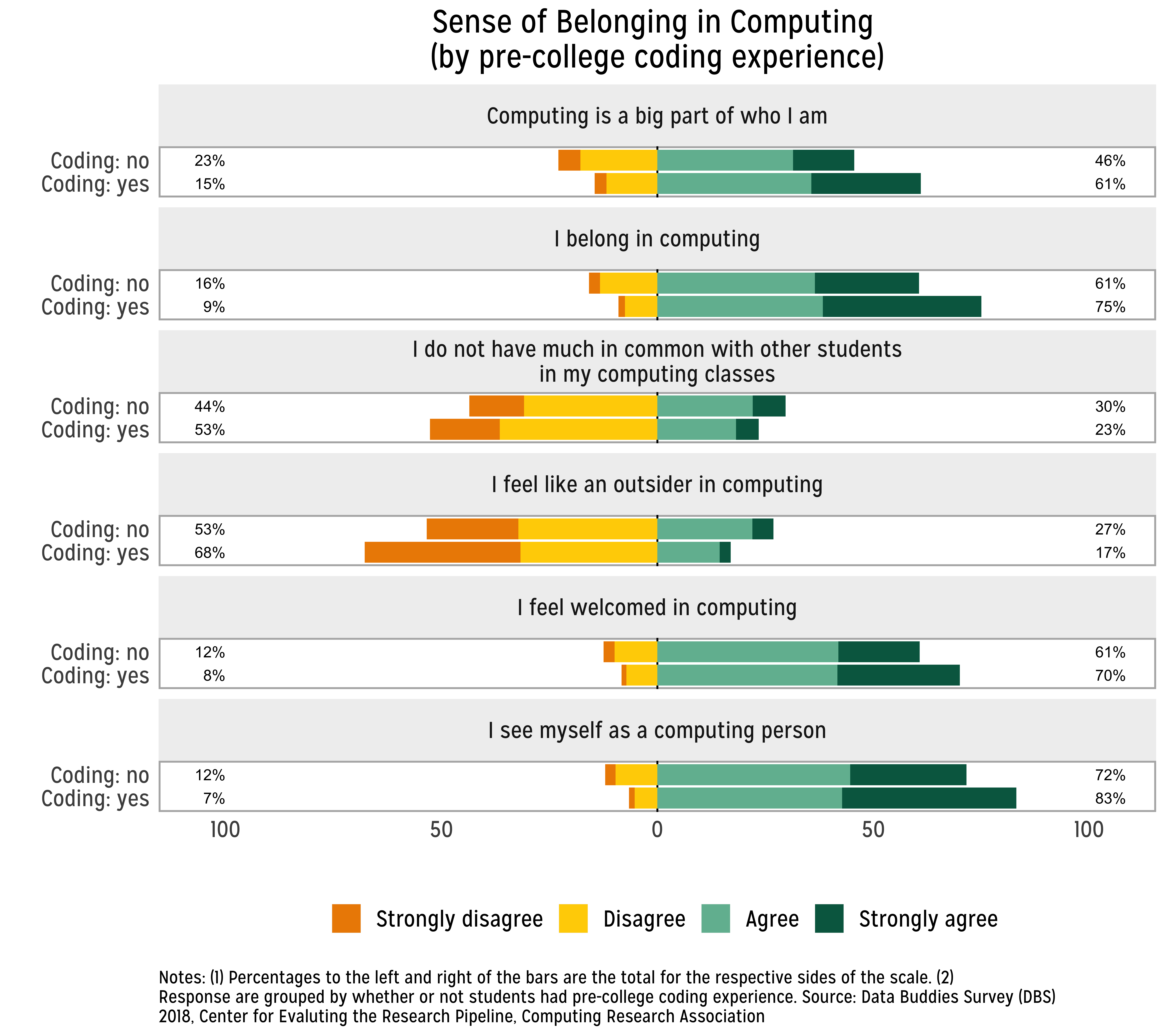Higher Sense of Belonging for Students with Pre-college Coding Experience

Engaging students in coding activities have been a major focus of promoting computing among K-12 population. Many organizations and companies (e.g., Code.org, Google CS First, Microsoft MakeCode) are now offering options for teaching coding to young students. These efforts are intended to increase interest in computing education and careers, and provide students with skills that will make them more competitive in the job market down the road even if they do not choose a computing career.
Analysis of data from 5,733 undergraduate students in computing shows that the benefits of engagement in coding early on continues onto the students’ college experience. According to the Data Buddies Survey (2018), undergraduate students with pre-college coding experience tend to have higher sense of belonging in computing. The graphic here shows students’ agreement with a number of survey questions intended to measure their sense of belonging in computing. The bars for students with and without prior coding experience illustrate that having these experiences is associated with higher levels belonging in all of the measures.
Compared to the students without any pre-college coding experience, 15% more of those with coding experience reported that computing is a big part of who they are, 14% more noted that they belong in computing, 9% more felt that there were welcomed in computing, and 11% more saw themselves as a computing person. For the items in the negative direction, 9% and 15% more of the students with coding experience expressed disagreement with the statements “I do not have much in common with other students in my computing classes” and “I feel like an outsider in computing”, respectively, compared to students without pre-college coding experience.
Given the importance of sense of belonging for retaining students in the field of computing, this finding highlights the potential long-term benefits of engaging students in coding early-on. There are certainly many other factors that play into student retention and not all coding experiences will provide significant benefits to the students. However, this consistent trend across the various measures of belonging suggests that educators and policy makers have good reason to support efforts for integrating coding into curricular and extra-curricular activities early-on.
Notes:
The survey data used in this chart were collected during fall 2018 by CERP via the Data Buddies Project. The sample includes 5,733 undergraduate students enrolled in a computing major. In this sample, 3,602 students reported having some programming experience prior to college.
Students’ sense of belonging in computing was measured using the following question and items: How much do you agree or disagree with the following statements? – I belong in computing, – I feel like an outsider in computing, – I feel welcomed in computing, – I see myself as a computing person. Students were asked to rate their agreement with each of these statements on a 5-point scale of Strongly Disagree (1), Disagree (2), Neither Agree nor Disagree (3), Agree (4) and Strongly Agree (5). The neutral responses (3) are not shown in the graphic but were taken into account while calculating the percentages.
 This analysis is brought to you by the CRA’s Center for Evaluating the Research Pipeline (CERP). CERP provides social science research and comparative evaluation for the computing community. Subscribe to the CERP newsletter here.
This analysis is brought to you by the CRA’s Center for Evaluating the Research Pipeline (CERP). CERP provides social science research and comparative evaluation for the computing community. Subscribe to the CERP newsletter here.
This material is based upon work supported by the National Science Foundation under grant numbers (CNS-1246649, CNS 1840724, DUE-1431112, and DUE 1821136). Any opinions, findings, and conclusions or recommendations expressed in this material are those of the author(s) and do not necessarily reflect the views of the National Science Foundation.








